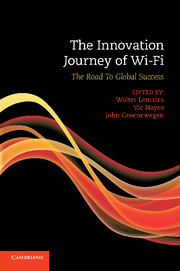Book contents
- Frontmatter
- Contents
- Figures
- Tables
- Contributors
- Preface
- Introduction
- 1 The case and the theoretical framework
- Part 1 The Wi-Fi Journey
- 2 NCR: taking the cue provided by the FCC
- 3 Creating a wireless LAN standard: IEEE 802.11
- 4 Crossing the chasm: the Apple AirPort
- 5 Hotspots: the Starbucks initiative
- 6 Wi-Fi-based community networks: Wireless Leiden
- Part 2 The Wi-Fi Journey in Perspective
- Part 3 Annexes
- Index
- References
6 - Wi-Fi-based community networks: Wireless Leiden
Published online by Cambridge University Press: 05 June 2012
- Frontmatter
- Contents
- Figures
- Tables
- Contributors
- Preface
- Introduction
- 1 The case and the theoretical framework
- Part 1 The Wi-Fi Journey
- 2 NCR: taking the cue provided by the FCC
- 3 Creating a wireless LAN standard: IEEE 802.11
- 4 Crossing the chasm: the Apple AirPort
- 5 Hotspots: the Starbucks initiative
- 6 Wi-Fi-based community networks: Wireless Leiden
- Part 2 The Wi-Fi Journey in Perspective
- Part 3 Annexes
- Index
- References
Summary
Wireless neighbourhood area networks
Wireless internet service providers typically exploit Wi-Fi technology to provide internet access services for a profit, or, in the case of location owners exploiting ‘hotspots’, the objective may be to stimulate the revenues of the core business. Next to these commercially oriented organisations, groups of volunteers have emerged that use Wi-Fi to provide internet access either for free or at very low cost. The shared internet access, often accompanied by direct communications between community members in the form of an intranet, is provided on the basis of interconnected Wi-Fi access points forming a wireless neighbourhood area network (WNAN).
These communities of volunteers tend to be motivated by their enthusiasm to explore the possibilities of new technologies and their wish to demonstrate their technological savvy. These groups of Wi-Fi volunteers are in many ways similar to the early ‘Homebrew Computer Club’ that emerged in Silicon Valley when the first do-it-yourself computer kits came on the market in the mid 1970s (Freiberger and Swaine, 1984). Members would come together to trade computer parts and exchange schematics and programming tips. A typical example of a Wi-Fi community in the Netherlands is ‘Wireless Leiden’, a group of volunteers that started in 2001 and has built a neighbourhood area network that has reached 100 nodes, covering most of the city of Leiden (some 160,000 inhabitants) and neighbouring villages – an area of about 500 square km (van Drunen et al., 2003; Vijn and Mourits, 2005).
- Type
- Chapter
- Information
- The Innovation Journey of Wi-FiThe Road to Global Success, pp. 175 - 194Publisher: Cambridge University PressPrint publication year: 2010
References
- 1
- Cited by



